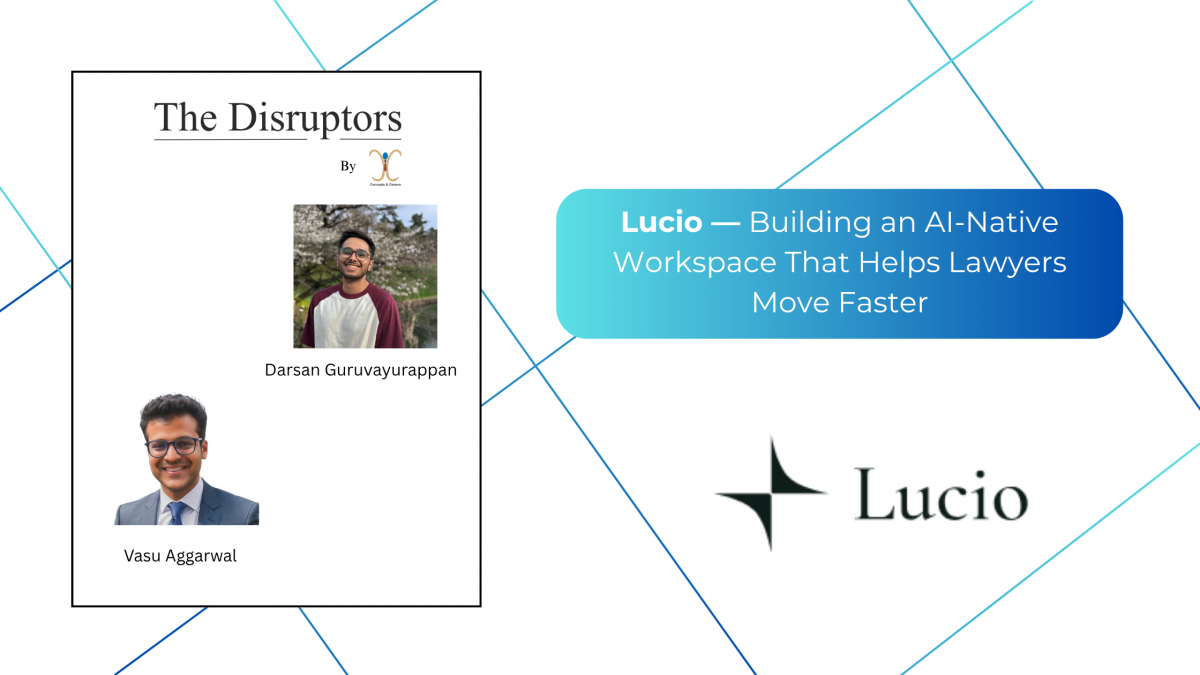- Have any questions?
- [email protected]
The Disruptor: Lucio — Building an AI-Native Workspace That Helps Lawyers Move Faster

Unlocking the Secrets Within: Exploring “The Power of Your Subconscious Mind” by Joseph Murphy
October 8, 2025
Mastering Leadership: A Deep Dive into “Executive Leadership: A Manual for the Principles of Supervision” by Nathan Axelrod
October 15, 2025Lead — what Lucio is doing and why it matters
Lucio is positioning itself as an AI-native workspace for lawyers — a set of tools that live inside lawyers’ workflows to extract, summarise, draft and surface legal insights from large document sets (contracts, pleadings, board minutes, judgments). The company emphasizes tight workflow integration (no tab switching), practice-specific features (due diligence, drafting, disputes), and enterprise-grade reliability — a pragmatic play to push adoption in a conservative profession.
The product (journalist + product-manager lens)
At its core Lucio combines three practical capabilities lawyers care about:
- Document ingestion & summarisation: fast, contextual summaries across dozens of file types so teams get an instant “stock summary” of a bundle.
- Extraction & reporting: automated extraction of key datapoints (share cap tables, clause lists, obligations) and generation of structured reports for M&A or compliance workflows.
- Drafting & redlines: generate contract drafts, propose amendments and create instant redlines to accelerate negotiations.
Lucio markets these features as part of a single, lawyer-centric workspace rather than a stand-alone chatbot — the difference being that the company wants AI to “disappear” into day-to-day work rather than be a separate app lawyers must learn. Early users praise speed and contextual accuracy on real case files.
Founders & team (people lens)
Public profiles and company materials list Darsan Guruvayurappan and Vasu Aggarwal as Lucio’s founding leadership; both bring a blend of legal-domain understanding and product/engineering experience. Lucio’s team frequently presents at law-school events and engages directly with firms—part of a playbook to reduce the friction of deploying AI in legal practices.
Funding & traction (investor lens)
Lucio announced a $5 million raise (reported across press and the company blog) led by DeVC with participation from high-net-worth investors such as Ashish Kacholia and Lashit Sanghvi; the capital is earmarked for product development, personalisation, and geographic expansion. This round validates market pull for practical legal AI that integrates into lawyer workflows.
On customers and deployments, Lucio has public references to partnerships and contracts with notable firms and in-house teams — examples include engagements with major Indian law firms and specialist boutiques, and announced deployments at firms such as S&R Associates; these case references are core proof points for enterprise sales.
Market opportunity & competitive landscape (analyst lens)
Legal work is document-heavy, regulated, and high-stakes — making accuracy, provenance and explainability non-negotiable. That creates a market sweet spot for tools that can:
- Reduce billable-hour friction (faster review + drafting).
- Lower mundane review costs (redaction, clause checking).
- Surface institutional memory (previous precedents, playbooks).
Competitors include established legaltech vendors and specialist AI startups offering contract review, e-discovery or drafting tools. Lucio’s differentiator is an integrated workspace built by lawyers (product + domain combo) and a go-to-market that targets both firms and in-house legal teams. The strategy bets that tight workflow ergonomics and legal-grade reliability beat flashy but brittle point tools.
Go-to-market & operations (operator lens)
To scale, Lucio must optimise three operational levers:
- Enterprise onboarding: reduce custom integration time (connectors to DMS, secure SSO, role-based access).
- Model governance: maintain explainability and document provenance for audit trails and privilege protection.
- Professional services to product: convert high-touch pilots into repeatable product modules, so margins improve as deployments scale.
The firm’s public content shows an emphasis on professional onboarding, and case studies seem to function as reference engines to win new law firms — a necessary approach in legal sales cycles.
Risks, regulation & ethics (compliance / risk lens)
Legal AI faces specific hurdles:
- Confidentiality & privilege: moving client documents into AI pipelines must preserve privilege — Lucio must demonstrate secure ingestion, ephemeral storage policies, and rigorous access controls.
- Hallucination & accuracy: erroneous legal reasoning has outsized consequences; the product’s competitive bar is tight accuracy and human-in-the-loop controls.
- Regulatory scrutiny: as jurisdictions tighten rules around AI and unauthorized practice of law, Lucio will need clear disclaimers and compliance frameworks.
The company’s approach — lawyer-led product design and enterprise contracts — suggests they’re building with these constraints top of mind, but they’ll need audited pipelines and third-party attestations to convince large firms.
Investor view — why watch Lucio
Thesis: If Lucio converts pilots into broad firm-wide deployments, it can become the “operating layer” for legal workflows — a high-value SaaS play (subscription + usage for heavy document review). The $5M round provides runway to validate enterprise sales motion and invest in model safety and compliance.
KPIs investors should track: pilot→enterprise conversion rate, ARR per customer, retention/churn for law firms, average deal size, and platform LTV vs. onboarding CAC.
Final take
Lucio is an archetype of the pragmatic legal-AI startup: domain-led, workflow-focused, and capitalising on a clear pain point (document slog). The big challenge — and opportunity — is converting cautious law firms into long-term SaaS customers by proving reliability, security and measurable time-savings. If Lucio nails product governance and enterprise sales, it can occupy a defensible niche in the expanding legaltech stack.





